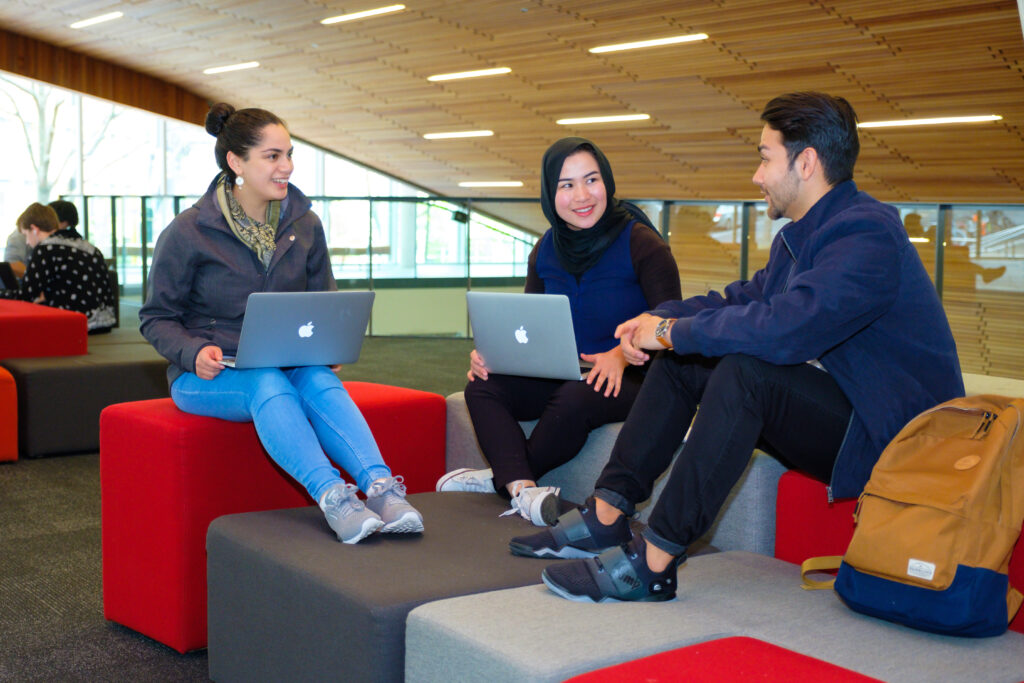Certificate in
Foundation Studies
Duration
- Standard: 1 year
- Fast-Track: 8/9 months
- Accelerated: 4/5 months
2025 intakes
14 July, 29 September
The AUT Certificate in Foundation Studies is issued by UP Education on behalf of Auckland University of Technology.
Programme delivery
Partnered with AUT, UP Education has been delivering foundation programmes for over 20 years. All teachers are trained and registered with the Teaching Council of New Zealand.
Our programmes are designed to equip students with the academic skills, English language proficiency, and cultural understanding needed to succeed at university. Students gain confidence in research, critical thinking, and assignment writing — all within a supportive learning environment.
We also place strong emphasis on student wellbeing, with dedicated staff who provide high-quality care and support for students’ academic, practical, and social needs.
Prepare to study at university
The programme is designed to help you prepare for university-level learning through:
- Developing study skills in English, including academic reading, writing, and independent learning
- Understanding academic integrity, such as APA referencing
- Building presentation skills and working collaboratively through group projects
Strengthening critical thinking and analytical skills
Students may apply for a pathway student visa, which covers the following two courses:
- The AUT Certificate in Foundation Studies
- AUT undergraduate degree
Who is this programme for?
Students who are currently studying at New Zealand secondary school Year 12 (NCEA Level 2), or
- Grade 11/12 (Asia), or
- Second/third year of senior high school, or equivalent
For students who do not meet the requirements above, there is a Foundation Connect option.

AUT
Foundation
Studies graduate
“The Foundation Studies programme at UP International College New Zealand gave me the academic skills, language support, and cultural understanding I needed to confidently transition into my studies at AUT.”
Emma from Vietnam
AUT Bachelor of Design in Communication Design student
How it works

1
Check requirements
Check if you meet the academic and English language requirements for the AUT Certificate in Foundation Studies.

3
Receive offer
If successful, you’ll receive an offer of place and can begin preparing for your study journey in New Zealand.
Subjects
The programme includes core subjects to build academic and language skills, along with electives tailored to your intended degree.
All subjects are internally assessed through a combination of tests, assignments, projects, and presentations, with assessments benchmarked against international standards to prepare students for success in AUT’s degree programmes.
Core subjects
In this subject, students will:
- Engage in academic discussions and improve their presentation skills
- Develop language and research skills that are necessary for writing academic essays
- Practise a range of strategies for reading and understanding complex academic texts
- Develop summary and paraphrasing skills
- Use citations and references in the APA Style
- Practise critical thinking and independent study skills that are essential for successful university studies
- Learn to take effective notes using a range of strategies and techniques
- Undertake independent research
Topics include:
- Study skills
- Exam techniques
- Academic listening and note-taking
- Listening for organisation in lectures
- Lecture comprehension and note-taking practice
- Microsoft Word Intermediate – Advanced
- Microsoft Excel Intermediate – Advanced
- PowerPoint
- Referencing (The Harvard System)
- Research project
- The case study (case analysis report)
- Oral presentations
Topics include:
- Geographical features of New Zealand
- New Zealand social customs
- Consumer issues in New Zealand
- Education
- New Zealand politics
- Treaty of Waitangi
- Major historical events
- Conservation in New Zealand
- The New Zealand legal system
- Employment in New Zealand
Elective subjects
Students will study 4 academic elective subjects, based on their own preferences and their undergraduate requirements.
Note: Availability of subjects might change each term.
Mathematics
If you want to apply for an Engineering degree, you must do this subject. The course is about the part of mathematics in which letters and other general symbols are used to represent in formulae and equations.
If you want to apply for an Engineering degree, you must do this subject. The course looks at collecting, analysing, interpreting and presenting data.
Sciences
Arts
There are two courses, one about social media and one about film studies.
In this course you will develop your ideas and skills to use in an application portfolio of work for AUT’s undergraduate Art and Design and Architecture programmes.
In this course you will learn about the Design industry, the history of Design and how it affects different societies.
In this course you will study modern New Zealand history and get to know the country you are studying and living in.
Commerce
This course looks at the behaviour of decision takers within the economy, such as individuals, households and firms.
This course looks at large-scale or general economic factors, such as interest rates and national productivity.
This course looks at the business of promoting and selling products or services.
This course looks at organisational behaviour and managing resources.
In this course you will look at the history of the industry and also about sustainability issues.
Degree progression requirements
To progress to an AUT undergraduate degree, students must:
- Successfully complete all credits in the AUT Certificate in Foundation Studies.
- Achieve a minimum of 55% in English I, 60% in English IIA, 65% in English IIB, and 50% in two other core subjects (totalling 60 credits).
- Achieve 50% or higher in all optional subjects.




